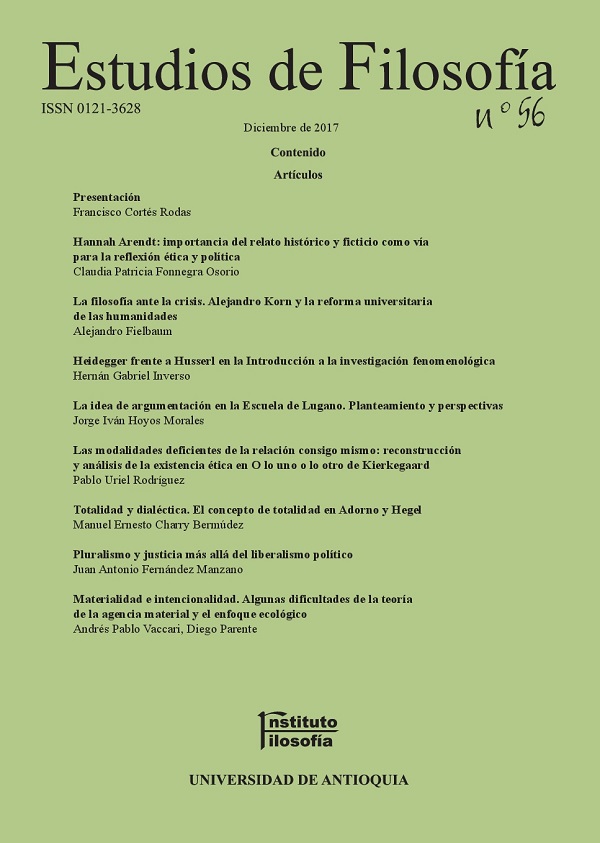Hannah Arendt: importance of the historical and fictional stories as a route for ethical and political reflection
DOI:
https://doi.org/10.17533/udea.ef.n56a02Keywords:
Narration, politics, action, identity, memory, judgementAbstract
This article presents the importance given by Hannah Arendt to historical and fictional stories as a way for ethical and political reflection. It studies, firstly, how stories enable the configuration of identity, of both a man and a community, because the narrative allows to give meaning to the fragility and contingency of human actions. In second place, it analyzes how the narrative allows keeping actions in the memory so they are not forgotten. Finally, it studies how the follow-up of stories contributes for understanding of the human world and strengthening the faculty of judging, for overcoming solipsism, a necessary element for the exercise of an ethical and political conception based on the recognition of human plurality.
Downloads
References
Arendt, H. (1967). Sobre la revolución, Trad. de P. Bravo, Madrid, Revista de Occidente.
Arendt, H. (1974). Los Orígenes del Totalitarismo, Trad. de G. Solana, Barcelona, Tauros.
Arendt, H. (1984). La vida del espíritu. El pensar, la voluntad y el juicio en la filosofía y en la política. Trad. de R. Montoro y F. Vallespín, Madrid, Centro de estudios constitucionales.
Arendt, H. (1995). De la historia a la acción, Trad. de F. Birulés, Barcelona, Paidós.
Arendt, H. (1996). Entre el pasado y el futuro, Trad. de A. Poljak Zorzut, Barcelona, Península.
Arendt, H. (1997). ¿Qué es la Política?, Trad. de R. Sala Carbó, Barcelona, Paidós.
Arendt, H. (1998). La Condición Humana, Trad. de R. Gil Novales, Barcelona, Paidós.
Arendt, H. (2000). Rahel Varnhagen. Vida de una judía, Trad. de D. Najmías, Barcelona, Lumen.
Arendt, H. (2001). Hombres en tiempos de Oscuridad, Trad. de C. Ferrari y A. Serrano de Haro, Barcelona, Gedisa.
Arendt, H. (2003). Conferencias sobre la filosofía política de Kant, Trad. de C. Corral, Buenos Aires, Paidós.
Arendt, H. (2006). Diario filosófico. 1906-1975, Trad. de R Gabás, Barcelona, Herder.
Aristóteles. (1974). La Poética, Madrid, Gredos.
Beiner, R. (2003). Hannah Arendt y la facultad de juzgar. En: Beiner, R (ed). Conferencias sobre la filosofía política de Kant, Buenos Aires, Paidós.
Bernstein, R. (2000). ¿Cambió Hannah Arendt de opinión?: Del mal radical a la banalidad del mal. En: Birulés, F (comp). El orgullo de pensar, Barcelona, Gedisa.
Birulés, F. (2007). Una herencia sin testamento: Hannah Arendt, Barcelona, Herder.
Birulés, F. & A. Fuster (2014). Hannah Arendt, más allá de la filosofía. Escritos sobre cultura, arte y filosofía, Madrid, Trotta.
Lefort, C. (2000). Hannah Arendt y la cuestión de lo político. En: Birulés, F (comp). El orgullo de pensar, Barcelona, Gedisa.
Fonnegra, C. (2006). Hannah Arendt. El juicio y la acción, Co-herencia, Medellín, Vol. 3, (5), julio, pp. 203-219.
Held, K. (2002). Existencia auténtica y mundo político, Estudios de filosofía, Medellín, Vol. 25, febrero, pp. 73-91.
Heródoto. (2002). Los nueve libros de la historia, Barcelona, Océano.
Hesíodo. (1997). Teogonía, Madrid, Alianza.
Hirschman, A. (1978). Las pasiones y los intereses. Argumentos políticos a favor del capitalismo antes de su triunfo. México: F.C.E.
Kant, I. (1991). Crítica del juicio, México, Porrúa.
Lafer, C. (2006). Experiencia, acción y narrativa. Reflexiones sobre un curso de Hannah Arendt, Revista de Occidente, Madrid, Vol. 000, (0305), pp. 78-98.
Larrosa, J. (2003). La experiencia de la lectura: Estudios sobre literatura y formación, México, F.C.E.
Martínez, E. (1994). La historia, relato de infinitos comienzos y ningún final, En: Birulés F y Cruz M. (comp). En torno a Hannah Arendt, Madrid, Centro de estudios constitucionales.
Ricoeur, P. (1983). Préface. En: Condition de l’homme moderne, France, Calmann-Levy.
Ricoeur, P. (1999). Historia y narratividad, Trad. de G. Aranzueque, México, Paidós.
Romo, F. (2010). Hannah Arendt ante la literatura: un episodio del pensamiento estética en tiempos de oscuridad [sitio en internet], disponible en: file:///C:/Users/corei/Downloads/Dialnet-HannahArendtAnteLaLiteratura-3831418.pdf. Acceso el 11 de mayo de 2017.
Sánchez, C. (2003). Hannah Arendt. El espacio de la política. Madrid, Centro de estudios constitucionales.
Todorov, T. (2008). Los abusos de la memoria, Trad. de M. Salazar, Madrid, Paidós.
Downloads
Published
How to Cite
Issue
Section
Categories
License
Copyright (c) 2017 Claudia Patricia Fonnegra Osorio

This work is licensed under a Creative Commons Attribution-NonCommercial-ShareAlike 4.0 International License.
Authors who publish with this journal agree to the following terms:
1. The Author retains copyright in the Work, where the term "Work" shall include all digital objects that may result in subsequent electronic publication or distribution.
2. Upon acceptance of the Work, the author shall grant to the Publisher the right of first publication of the Work.
3. The Author shall grant to the Publisher a nonexclusive perpetual right and license to publish, archive, and make accessible the Work in whole or in part in all forms of media now or hereafter known under a Creative Commons Attribution-NoCommercia-ShareAlike (CC BY-NC-SA 4.0), or its equivalent, which, for the avoidance of doubt, allows others to copy, distribute, and transmit the Work under the following conditions: (a) Attribution: Other users must attribute the Work in the manner specified by the author as indicated on the journal Web site;(b) Noncommercial: Other users (including Publisher) may not use this Work for commercial purposes;
4. The Author is able to enter into separate, additional contractual arrangements for the nonexclusive distribution of the journal's published version of the Work (e.g., post it to an institutional repository or publish it in a book), as long as there is provided in the document an acknowledgement of its initial publication in this journal;
5. Authors are permitted, and Estudios de Filosofía promotes, to post online the preprint manuscript of the Work in institutional repositories or on their Websites prior to and during the submission process, as it can lead to productive exchanges, as well as earlier and greater citation of published work (see The Effect of Open Access). Any such posting made before acceptance and publication of the Work is expected be updated upon publication to include a reference to the Estudios de Filosofía's assigned URL to the Article and its final published version in Estudios de Filosofía.















